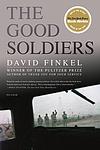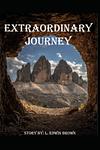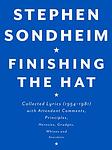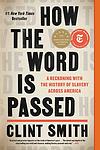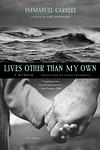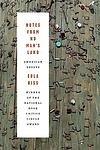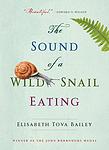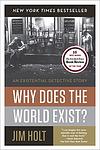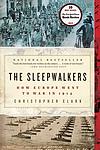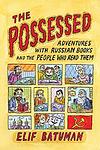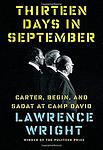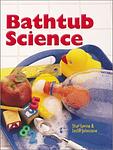The Greatest "Nonfiction, Fiction" Books Since 2000
Click to learn how this list is calculated.
This list represents a comprehensive and trusted collection of the greatest books. Developed through a specialized algorithm, it brings together 300 'best of' book lists to form a definitive guide to the world's most acclaimed books. For those interested in how these books are chosen, additional details can be found on the rankings page.
Genres
Countries
Date Range
Reading Statistics
Click the button below to see how many of these books you've read!
Download
If you're interested in downloading this list as a CSV file for use in a spreadsheet application, you can easily do so by clicking the button below. Please note that to ensure a manageable file size and faster download, the CSV will include details for only the first 500 books.
Download-
26. The Years by Annie Ernaux
"The Years" is a compelling narrative that blends autobiography and collective history to depict the evolution of French society from the 1940s to the early 2000s. Through a blend of personal memories, shared experiences, and common artifacts, the book captures the passage of time and the changes it brings to individual lives and collective identity. The author uses an innovative form of writing, eschewing a traditional linear narrative and personal pronouns, to create a reflective and powerful exploration of memory, aging, and the continuous transformation of societal norms and personal aspirations.
-
27. The Good Soldiers by David Finkel
"The Good Soldiers" is a non-fiction book that follows the experiences of American soldiers during the Iraq War. The book focuses on the soldiers of the 2-16 Infantry Battalion and their deployment to Baghdad in 2007. Through the eyes of these soldiers, the author, David Finkel, provides a vivid and visceral account of the brutality and chaos of the war. The book explores the soldiers' experiences of combat, loss, and trauma, as well as the impact of the war on their families and loved ones back home. Overall, "The Good Soldiers" is a powerful and moving tribute to the bravery and sacrifice of American soldiers in Iraq.
-
28. The Boy In The Moon: A Father’s Journey To Understand His Extraordinary Son by Ian Brown
"The Boy in the Moon" is a memoir written by Ian Brown, a Canadian journalist, about his life with his severely disabled son, Walker. The book chronicles Brown's struggles to understand and care for his son, who suffers from a rare genetic disorder that leaves him unable to walk, talk, or even eat on his own. Brown's journey is one of heartbreak, frustration, and ultimately, acceptance, as he learns to love and appreciate his son for who he is, rather than who he might have been. Through his compelling and deeply personal narrative, Brown sheds light on the challenges faced by families with disabled children, and offers a poignant meditation on the nature of love, family, and the human condition.
-
29. Raymond Carver: A Writer’s Life by Carol Sklenicka
"Raymond Carver: A Writer’s Life" is a comprehensive biography of the renowned American short story writer. The book follows Carver's life from his childhood in rural Oregon to his rise to literary fame in the 1980s. Sklenicka delves into Carver's personal struggles with alcoholism and his complicated relationships with his family, friends, and fellow writers. She also examines his writing process and the evolution of his style. Through extensive research and interviews with those closest to Carver, Sklenicka paints a vivid portrait of a complex and influential writer.
-
30. Hidden Valley Road by Robert Kolker
"Hidden Valley Road" by Robert Kolker is a non-fiction book that tells the story of the Galvin family, who had 12 children, six of whom were diagnosed with schizophrenia. The book delves into the family's struggles with mental illness, the medical community's understanding of schizophrenia at the time, and the impact the family's situation had on each member. It also explores the history of schizophrenia research and treatments, as well as the Galvin family's contribution to advancing our understanding of the disease.
-
31. Finishing The Hat: Collected Lyrics With Attendant Comments, Principles, Heresies, Grudges, Whines And Anecdotes by Stephen Sondheim
"Finishing The Hat" is a collection of Stephen Sondheim's lyrics from his illustrious career in musical theater, along with his personal commentary and insights on the creative process. Sondheim shares his principles, heresies, grudges, whines, and anecdotes, providing a unique look into the mind of one of the most celebrated composers and lyricists of our time. This book is a must-read for anyone interested in the art of musical theater and the creative process behind it.
-
32. Apollo’s Angels: A History Of Ballet by Jennifer Homans
"Apollo's Angels: A History of Ballet" by Jennifer Homans is a comprehensive and fascinating exploration of the history of ballet, tracing its origins in the French courts of the 17th century to its modern-day global prominence. Homans delves into the cultural and social contexts that shaped ballet over the centuries, examining the roles of gender, politics, and artistic innovation. She also provides insightful analyses of the most important ballets and choreographers throughout history, highlighting their contributions to the art form. A must-read for anyone interested in the history of dance and the arts.
-
33. Arguably: Essays by Christopher Hitchens
"Arguably: Essays" is a collection of essays written by Christopher Hitchens, covering topics ranging from politics, literature, and religion to popular culture, sports, and travel. Hitchens was known for his sharp wit, critical thinking, and fearless approach to controversial issues, and this book showcases his best writing over the years. The essays are thought-provoking, insightful, and often humorous, making for an engaging read that challenges readers to think deeply about the world around them.
-
34. How The Word Is Passed: A Reckoning With The History Of Slavery Across America by Clint Smith
"How The Word Is Passed" is a powerful and thought-provoking exploration of the legacy of slavery in America. Through a series of vivid and evocative essays, author Clint Smith takes readers on a journey across the United States, visiting sites that are deeply connected to the history of slavery and its aftermath. From Monticello to Angola Prison, Smith offers a nuanced and insightful look at the ways in which slavery has shaped our country and continues to impact our lives today. With a clear-eyed and compassionate approach, "How The Word Is Passed" is a must-read for anyone interested in understanding the complex and ongoing legacy of slavery in America.
-
35. Lives Other Than My Own by Emmanuel Carrère
"Lives Other Than My Own" is an emotionally charged narrative that explores the lives of two women who have experienced immense loss, one from a tsunami and the other from cancer. The author, through his personal encounters, delves into the raw emotions, resilience, and the profound bonds of family and friendship that emerge from these tragic circumstances. The book is a thoughtful exploration of empathy, offering a poignant look at the strength of human spirit in the face of adversity.
-
36. Notes from No Man's Land: American Essays by Eula Biss
"Notes from No Man's Land: American Essays" is a collection of essays that explores the concept of race in America. The author uses personal experiences, historical events, and cultural analysis to examine the complexities of racial identity, privilege, and the often unacknowledged history of racial violence in the United States. The book also delves into the author's own struggles with her white identity and how it intersects with her experiences of living in predominantly black neighborhoods.
-
37. The Tender Land: A Family Love Story by Kathleen Finneran
This memoir is a poignant exploration of grief, family bonds, and the enduring impact of loss. The narrative centers around the author's family, particularly focusing on the aftermath of her younger brother's suicide at the age of fifteen. Through a series of vivid vignettes, the author delves into her family's history, the complexities of their relationships, and the individual struggles each member faces. The book is a tender and introspective journey through memory and mourning, as the author seeks understanding and healing in the wake of tragedy, ultimately painting a deeply moving portrait of love, sorrow, and the human condition.
-
38. The Sound Of A Wild Snail Eating by Renee Raudman, Elisabeth Tova Bailey
In this contemplative memoir, a bedridden woman finds solace and profound lessons in the life of a wild snail that has taken up residence on her nightstand. As her own physical world shrinks due to a debilitating illness, the snail's simple, yet intricate existence offers her a unique perspective on the nature of survival, resilience, and the intricate balance of life. Through observations of the snail's habits and the parallels drawn between its life and human existence, the narrative weaves a rich tapestry that explores the wonder and beauty of nature, even in its smallest manifestations, and reflects on the healing power of the natural world.
-
39. Why Does The World Exist? An Existential Detective Story by Jim Holt
In "Why Does The World Exist? An Existential Detective Story," Jim Holt explores the question of why there is something rather than nothing. He interviews philosophers, scientists, and theologians to try to find an answer, delving into topics such as the nature of existence, the origins of the universe, and the meaning of life. Along the way, he examines various theories and arguments, from the Big Bang to the concept of God, in an attempt to uncover the ultimate explanation for the existence of the world.
-
40. The Sleepwalkers: How Europe Went To War In 1914 by Christopher Clark
"The Sleepwalkers" by Christopher Clark is a comprehensive account of the events leading up to World War I. The book argues that the war was not caused by any one nation or individual, but rather a combination of factors including nationalism, alliances, and miscommunication. Clark explores the complex political landscape of Europe in the early 20th century and the actions of key players such as Kaiser Wilhelm II and Archduke Franz Ferdinand. The book provides a detailed analysis of the events leading up to the war and challenges traditional narratives of blame and responsibility.
-
41. The Possessed by Elif Batuman
"The Possessed" is a compelling narrative that combines memoir, criticism, and travel writing to explore the author's deep fascination with Russian literature. Through her experiences as a graduate student at Stanford, her travels to Turkey, Russia, and Uzbekistan, and her encounters with other scholars, the author delves into the works of great Russian authors such as Tolstoy, Dostoevsky, and Chekhov, while also reflecting on the nature of literature, identity, and the human condition.
-
42. Japanese Philosophy by John C. Maraldo, Thomas P. Kasulis, James W. Heisig
This book provides a comprehensive overview of Japanese philosophy, exploring its unique characteristics and its evolution through history. It delves into the diverse intellectual traditions of Japan, including both well-known philosophical schools and lesser-known but equally significant ideas. The text examines how Japanese philosophy has been influenced by and has interacted with other philosophical traditions, particularly Western philosophy, while also highlighting its distinct approach to fundamental philosophical issues such as ethics, aesthetics, and the nature of reality. Through a detailed analysis, the book offers insights into how Japanese philosophical thought has contributed to broader philosophical discourse and how it reflects the cultural and historical context of Japan.
-
43. After The Music Stopped: The Financial Crisis, The Response, And The Work Ahead by Alan S. Blinder
After the Music Stopped is a comprehensive analysis of the 2008 financial crisis and its aftermath. Alan S. Blinder, a former vice chairman of the Federal Reserve, examines the causes of the crisis, the government's response to it, and the ongoing challenges facing the global economy. Blinder argues that the crisis was caused by a combination of factors, including lax regulation, excessive risk-taking, and a housing bubble. He also explores the various policy responses to the crisis, including the Troubled Asset Relief Program (TARP) and the Dodd-Frank Wall Street Reform and Consumer Protection Act. Finally, Blinder offers recommendations for preventing future financial crises and ensuring long-term economic stability.
-
44. Wave by Sonali Deraniyagala
"Wave" is a memoir by Sonali Deraniyagala, recounting her experience of losing her entire family in the 2004 Indian Ocean tsunami. Deraniyagala, a Sri Lankan-born economist, was on vacation with her husband, two young sons, and parents when the wave hit. She was the only survivor. The book is a raw and emotional account of her grief and struggle to come to terms with the loss of her loved ones, as well as her own identity and sense of purpose. Through her writing, Deraniyagala confronts the complexities of survivor's guilt, trauma, and the enduring power of love.
-
45. The Philosophical Works Of Al Kindi by Peter E. Pormann, Peter Adamson
This book is a comprehensive compilation and analysis of the works of Al-Kindi, often regarded as the first of the Muslim peripatetic philosophers. The text delves into Al-Kindi's extensive contributions to various fields of knowledge, including philosophy, mathematics, astronomy, and medicine, highlighting his role as a pivotal figure in the translation and transmission of ancient Greek philosophy to the Islamic world. Through translations of his works and insightful commentary, the book provides a critical exploration of Al-Kindi's synthesis of philosophical thought and his influence on subsequent Islamic and Western intellectual traditions.
-
46. An Immense World by Ed Yong
"An Immense World" is a collection of science essays written by Ed Yong, a science journalist. The book explores a wide range of scientific topics, from the behavior of animals to the complexities of the human microbiome. Yong's writing is accessible and engaging, making complex scientific concepts easy to understand for readers of all backgrounds. The essays are thought-provoking and provide a glimpse into the fascinating world of science. Overall, "An Immense World" is a must-read for anyone interested in science and the natural world.
-
47. Thirteen Days In September: Carter, Begin, And Sadat At Camp David by Lawrence Wright
"Thirteen Days In September" by Lawrence Wright is a detailed account of the historic peace negotiations that took place between President Jimmy Carter, Israeli Prime Minister Menachem Begin, and Egyptian President Anwar Sadat at Camp David in September 1978. The book provides a behind-the-scenes look at the intense negotiations and personal dynamics between the leaders, as they worked to reach a peace agreement that would end decades of conflict in the Middle East. Wright's narrative is a gripping and informative account of a pivotal moment in modern history.
-
48. Empire Of Cotton: A Global History by Sven Beckert
"Empire of Cotton" by Sven Beckert is a comprehensive global history of cotton, exploring its impact on the world economy, politics, and society from the 18th century to the present day. Beckert argues that cotton played a crucial role in the development of capitalism, colonialism, and imperialism, and that its production and trade were intimately linked to the exploitation of labor, the growth of slavery, and the rise of industrialization. The book offers a fascinating and thought-provoking perspective on the complex and often violent history of cotton and its enduring legacy in the modern world.
-
49. Bathtub Science by Shar Levine
"Bathtub Science" is an engaging children's book that introduces young readers to the fundamentals of science through a series of fun, educational experiments that can be conducted using everyday items found in most homes. The book is designed to make learning interactive and accessible, encouraging children to explore scientific concepts such as density, buoyancy, and surface tension right from the comfort of their own bathrooms. Through easy-to-follow instructions and clear explanations, the book aims to spark curiosity and a love for science in young minds by demonstrating how ordinary materials can reveal extraordinary scientific principles.
-
50. Global Health by Ann Lindstrand
This book provides a comprehensive overview of global health, addressing the key issues, challenges, and strategies involved in improving health outcomes worldwide. It delves into the determinants of health, the burden of diseases, and the complex interplay between health, economic development, and social factors. The text emphasizes the importance of a multidisciplinary approach, incorporating perspectives from epidemiology, public policy, and international relations, to tackle the global health disparities and pave the way towards achieving equity in health for all populations. Through case studies and analysis of current trends, the book offers insights into the roles of various stakeholders, including governments, NGOs, and the private sector, in advancing public health goals on a global scale.
Reading Statistics
Click the button below to see how many of these books you've read!
Download
If you're interested in downloading this list as a CSV file for use in a spreadsheet application, you can easily do so by clicking the button below. Please note that to ensure a manageable file size and faster download, the CSV will include details for only the first 500 books.
Download
